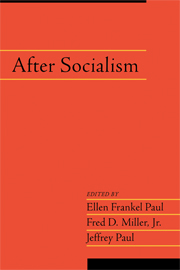Book contents
- Frontmatter
- Contents
- Introduction
- Acknowledgments
- Contributors
- Can There Be an “After Socialism”?
- The Cultural Contradictions of Socialism
- The Idol of History
- Backwards into the Future: Neorepublicanism as a Postsocialist Critique of Market Society
- What's Left of the Welfare State?
- The Roots and Rationale of Social Democracy
- An Interpretation and Defense of the Socialist Principle of Distribution
- Some Feasible Alternatives to Conventional Capitalism
- After Socialism: Mutualism and a Progressive Market Strategy
- Sovereignty, Commerce, and Cosmopolitanism: Lessons from Early America for the Future of the World
- Beyond Fear and Greed?
- Liberalism's Divide, After Socialism and Before
- INDEX
Liberalism's Divide, After Socialism and Before
Published online by Cambridge University Press: 01 June 2010
- Frontmatter
- Contents
- Introduction
- Acknowledgments
- Contributors
- Can There Be an “After Socialism”?
- The Cultural Contradictions of Socialism
- The Idol of History
- Backwards into the Future: Neorepublicanism as a Postsocialist Critique of Market Society
- What's Left of the Welfare State?
- The Roots and Rationale of Social Democracy
- An Interpretation and Defense of the Socialist Principle of Distribution
- Some Feasible Alternatives to Conventional Capitalism
- After Socialism: Mutualism and a Progressive Market Strategy
- Sovereignty, Commerce, and Cosmopolitanism: Lessons from Early America for the Future of the World
- Beyond Fear and Greed?
- Liberalism's Divide, After Socialism and Before
- INDEX
Summary
INTRODUCTION
For most of the century and a half that began roughly with the later works of John Stuart Mill, the most important divide within liberal political thought was that between classical (or market, or libertarian) liberalism and welfare (or new, or redistributionist) liberalism. The questions that were important to the socialist/liberal debate also became important for debates within liberalism: What is the relationship between property and freedom? Between free trade and freedom? Is freedom of commercial activity on a moral par with other sorts of freedom? Is the alleviation of poverty or material need a more important political goal than freedom? How do freedom and equality fit together in a liberal understanding of justice? What degree of state economic planning, or state taxation and expenditure, is compatible with liberal freedom?
More than once in these decades, it was suggested that only one of these streams of thought is truly liberal, that only one should be thought of as continuing the moral aspirations and ideals of the liberal tradition. Some libertarians are much enamored of Joseph Schumpeter's remark that “as a supreme, if unintended, compliment, the enemies of the system of private enterprise have thought it wise to appropriate its label,” and maintain that the philosophy known as welfare liberalism (or, in general political discussion in the United States, simply “liberalism”) is really just social democracy or democratic socialism in sheep's clothing. Welfarists in return have sometimes seen libertarianism as a species of conservatism.
- Type
- Chapter
- Information
- After Socialism , pp. 278 - 298Publisher: Cambridge University PressPrint publication year: 2003



